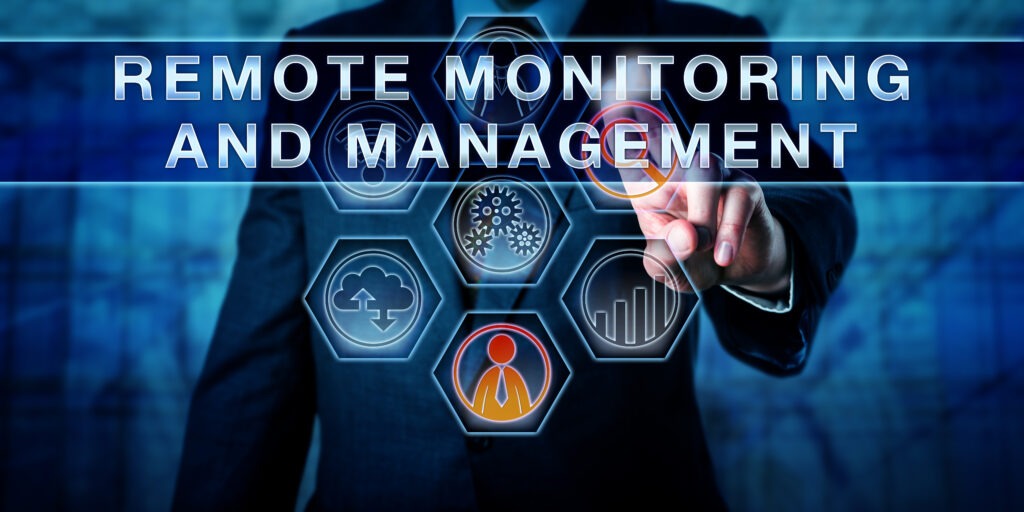
Small businesses are increasingly relying on digital tools and platforms to stay competitive. However, with this increased reliance on technology comes the challenge of managing and maintaining complex IT systems. For many small businesses, the solution to this challenge lies in Remote Managed IT Services. In this post, we’ll explore what Remote Managed IT Services are, their key components, and the critical benefits they offer to small businesses.
What Are Remote Managed IT Services?
Remote Managed IT Services refer to the practice of outsourcing the management and maintenance of your business’s IT infrastructure to a third-party service provider. Traditional IT support requires on-site visits. Remote Managed IT Services allow a specialized team to monitor, manage, and optimize your IT systems from a distance.
This approach means that your IT infrastructure is monitored 24/7. Issues are detected and resolved quickly. Your business can benefit from a proactive IT management strategy without needing an in-house team.
The Components of Remote Managed IT Services
To understand the full scope of Remote Managed IT Services, it’s essential to break down the key components that make up a comprehensive managed services package. Here are some of the most critical elements:
Network Monitoring and Management:
- Continuous monitoring of your network infrastructure to detect and resolve issues before they escalate.
- Management of network devices such as routers, switches, and firewalls to ensure optimal performance and security.
Endpoint Management:
- Remote management of all devices connected to your network, including computers, servers, and mobile devices.
- Regular updates and patches to ensure devices are secure and running efficiently.
Data Backup and Disaster Recovery:
- Automated backups of critical business data to ensure that it can be recovered in the event of data loss.
- Disaster recovery planning to minimize downtime and ensure business continuity in the face of unexpected events.
Cybersecurity Management:
- Implementation of robust security measures, including firewalls, antivirus software, and encryption, to protect your business from cyber threats.
- Continuous monitoring for security breaches and immediate response to any detected threats.
Help Desk Support:
- Access to a team of IT professionals who can provide remote support for any technical issues that arise.
- Troubleshooting, guidance, and problem resolution available via phone, email, or chat.
Cloud Services Management:
- Management of cloud-based services and applications, ensuring they are secure, properly configured, and fully optimized.
- Assistance with migration to the cloud and ongoing maintenance of cloud environments.
Software and Hardware Management:
- Regular updates and maintenance of software applications to keep them running smoothly.
- Management of hardware assets, including lifecycle management and recommendations for upgrades or replacements.
IT Strategy and Consulting:
- Strategic planning and consulting services to align your IT infrastructure with your business goals.
- Recommendations for technology investments that can drive growth and efficiency.
The Benefits of Remote Managed IT Services for Small Businesses
Now that we’ve covered the components of Remote Managed IT Services, let’s explore the numerous benefits that make these services critical for small businesses.
1. Cost Savings
One of the most significant advantages of Remote Managed IT Services is the potential for cost savings. For small businesses, hiring a full-time, in-house IT team can be prohibitively expensive. In addition to salaries, there are costs associated with training, benefits, and ongoing education to keep the team updated on the latest technologies.
With Remote Managed IT Services, you pay a predictable monthly fee for access to a team of experts who can handle all your IT needs. This model eliminates the need for large upfront investments and reduces the risk of unexpected costs due to IT failures.
2. Access to Expertise
Small businesses often lack the resources to hire specialized IT professionals with expertise in areas like cybersecurity, cloud computing, and data management. Remote Managed IT Services give you access to a team of experts with diverse skill sets, ensuring that your IT infrastructure is managed by professionals who understand the latest trends and technologies.
This expertise can be particularly valuable when navigating complex issues like compliance with industry regulations or implementing advanced cybersecurity measures.
3. Proactive Maintenance and Monitoring
One of the key advantages of Remote Managed IT Services is the ability to proactively monitor and maintain your IT systems. Instead of waiting for something to go wrong, your managed service provider (MSP) continuously monitors your network, servers, and devices, identifying potential issues before they become critical problems.
This proactive approach reduces downtime, minimizes disruptions to your business operations, and ensures that your IT infrastructure remains in optimal condition.
4. Enhanced Security
In today’s digital landscape, cybersecurity is a top concern for businesses of all sizes. Small businesses are often targeted by cybercriminals because they may not have the same level of security as larger organizations. Remote Managed IT Services provide robust cybersecurity measures, including firewalls, encryption, antivirus software, and real-time monitoring.
Your MSP will also stay updated on the latest threats and vulnerabilities, ensuring that your business is protected against emerging risks. In the event of a security breach, your provider can quickly respond to mitigate the damage and restore your systems.
5. Scalability and Flexibility
As your business grows, your IT needs will evolve. Remote Managed IT Services offer the scalability and flexibility to adapt to these changes. Whether you’re adding new employees, expanding to new locations, or implementing new technologies, your MSP can scale services up or down as needed.
This flexibility ensures that you only pay for the services you need at any given time, making it easier to manage costs while still benefiting from a robust IT infrastructure.
6. Focus on Core Business Activities
Managing IT systems can be time-consuming and distracting, especially for small business owners and employees who are not IT experts. By outsourcing IT management to a remote MSP, you free up valuable time and resources that can be better spent on core business activities.
This shift allows you to focus on what you do best—whether it’s serving customers, developing new products, or growing your business—while leaving the technical details to the experts.
7. Improved Business Continuity
Business continuity is a critical concern for any organization. A sudden IT failure or data loss event can have devastating consequences, leading to lost revenue, damaged reputation, and even legal liabilities. Remote Managed IT Services include data backup and disaster recovery solutions designed to keep your business running smoothly, even in the face of unexpected challenges.
With a comprehensive disaster recovery plan in place, you can be confident that your critical data is safe and that your business can quickly recover from any disruption.
8. Compliance and Regulatory Support
Many industries have strict regulations governing how businesses must manage and protect their data. Non-compliance can result in hefty fines, legal penalties, and loss of customer trust. Remote Managed IT Services providers are well-versed in industry regulations and can help ensure that your business remains compliant.
Whether it’s meeting data protection standards, maintaining audit trails, or ensuring secure access to sensitive information, your MSP can guide you through the complexities of regulatory compliance.
9. Access to the Latest Technology
Technology is constantly evolving, and keeping up with the latest advancements can be challenging for small businesses. Remote Managed IT Services providers are at the forefront of technological innovation, ensuring that your business has access to the latest tools and solutions.
From cloud computing to advanced analytics, your MSP can help you leverage cutting-edge technology to drive business growth and stay competitive in the market.
10. Peace of Mind
Finally, one of the most valuable benefits of Remote Managed IT Services is the peace of mind they provide. Knowing that your IT infrastructure is in the hands of experienced professionals allows you to focus on running your business without worrying about technical issues.
Whether it’s protecting your data from cyber threats, ensuring that your systems are always up and running, or providing quick support when problems arise, your MSP is there to keep your business on track.
Conclusion
In conclusion, Remote Managed IT Services are not just a convenience—they are a critical component of modern business operations. For small businesses, these services offer a cost-effective, scalable, and secure solution to the challenges of managing IT systems. By partnering with a trusted MSP, you can enjoy the benefits of expert IT management, enhanced security, and the freedom to focus on growing your business.
As technology continues to play an increasingly important role in business success, Remote Managed IT Services provide the support and expertise you need to stay competitive and thrive in today’s digital landscape.


